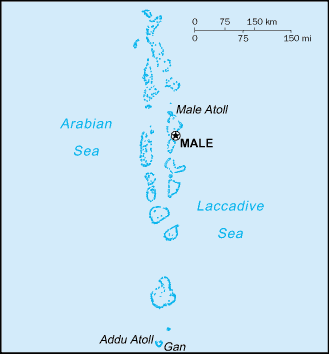Investing in Maldives


Tourism, Maldives' largest economic activity, accounts for 28% of GDP and more than 60% of foreign exchange receipts. Over 90% of government tax revenue comes from import duties and tourism-related taxes. Fishing is the second leading sector, but the fish catch has dropped sharply in recent years. Agriculture and manufacturing continue to play a lesser role in the economy, constrained by the limited availability of cultivable land and the shortage of domestic labor. Most staple foods must be imported. In the last decade, real GDP growth averaged around 6% per year except for 2005, when GDP declined following the Indian Ocean tsunami, and in 2009, when GDP shrank by 3% as tourist arrivals declined and capital flows plunged in the wake of the global financial crisis. Falling tourist arrivals and fish exports, combined with high government spending on social needs, subsidies, and civil servant salaries contributed to a balance of payments crisis, which was eased with a December 2009, $79.3 million dollar IMF standby agreement. However, after the first two disbursements, the IMF withheld subsequent disbursements due to concerns over Maldives' growing budget deficit. Maldives has had chronic budget deficits in recent years and the government's plans to cut expenditures have not progressed well. A new Goods and Services Tax on Tourism (GST) was introduced in January 2011 and a new Business Profit Tax is to be introduced during the year. These taxes are expected to increase government revenue by about 25%. The government has privatized the main airport and is partially privatizing the energy sector. Tourism will remain the engine of the economy. The Government of the Maldives has aggressively promoted building new island resorts. Due to increasing tourist arrivals, the government expects GDP growth around 4.0% in 2011. Diversifying the economy beyond tourism and fishing, reforming public finance, and increasing employment opportunities are major challenges facing the government. Over the longer term Maldivian authorities worry about the impact of erosion and possible global warming on their low-lying country; 80% of the area is 1 meter or less above sea level.
Maldives Monetary Authority - http://www.mma.gov.mv/
Learn more:
Back to Country Investing



